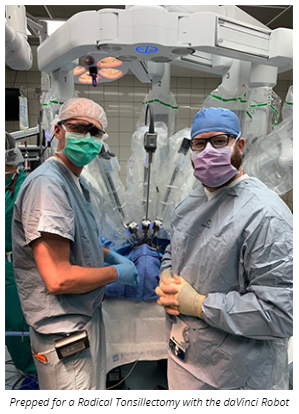Tinnitus or Sound Sensitivity? Here's When to Seek Help from a Hearing Clinic
Checking out the Field of Otolaryngology: What to Expect When You Consult an ENT
Otolaryngology, frequently described as ENT, incorporates the diagnosis and treatment of throat, ear, and nose problems. For those experiencing relevant concerns, getting in touch with an ENT specialist can give quality and alleviation. Recognizing what to anticipate during such assessments is necessary for effective interaction and treatment. This review will certainly lay out key elements of the ENT experience, including typical factors for gos to and the processes associated with medical diagnosis and therapy.

Comprehending Otolaryngology: A Review
Otolaryngology, usually referred to as ENT (Throat, ear, and nose) medication, is a specific branch of medicine that concentrates on the diagnosis and treatment of problems affecting these essential areas of the body. This field incorporates a vast array of disorders, consisting of those associated to hearing, balance, respiratory feature, and speech. Otolaryngologists are trained to manage both clinical and medical therapies, utilizing advanced methods and modern technologies. Their know-how extends beyond conventional ailments, resolving concerns such as allergic reactions, sinus infections, and hearing loss. In addition, they play an essential function in the monitoring of head and neck cancers, providing comprehensive treatment tailored to individual client demands. Generally, otolaryngology continues to be necessary for keeping health and wellness and lifestyle in damaged individuals.
Typical Factors to See an ENT Expert
Numerous people look for the know-how of an ENT expert for a variety of reasons, reflecting the varied nature of conditions that influence the nose, throat, and ear. Typical problems include persistent sinus problems, which typically causes persistent nasal congestion and face pain. Allergies and their associated signs, such as itching and sneezing, also prompt sees to these professionals (Otolaryngologist). Hearing loss, whether sudden or progressive, is an additional substantial reason for examination. Furthermore, individuals might look for evaluation for throat problems, consisting of consistent hoarseness or swallowing problems. Sleep apnea, defined by cut off breathing during sleep, is frequently addressed by ENT specialists. Each of these conditions highlights the value of specialized care in managing complicated ENT-related health concerns
Planning for Your ENT Appointment
When preparing for an ENT consultation, it is important to collect appropriate info and take into consideration any particular concerns. Patients need to put together a thorough clinical history, consisting of previous ear, nose, or throat issues, surgeries, and current drugs. Recording signs and symptoms-- such as frequency, intensity, and period-- can supply useful understandings for the ENT expert. Additionally, people need to prepare a checklist of questions they want to ask, making certain that all worries are addressed during the visit. Bringing along any type of pertinent medical records or test outcomes can further assist the ENT in comprehending the individual's problem. Lastly, patients need to confirm their consultation details, including day, time, and area, to decrease any type of last-minute confusion. Appropriate preparation can boost the performance of the consultation and cause far better end results.
What to Anticipate Throughout the Examination
As the assessment starts, the individual can expect to take part in a detailed conversation with the ENT specialist about their symptoms and medical history. The specialist will certainly ask about the period, regularity, and intensity of symptoms such as hearing loss, nasal blockage, or aching throat. Furthermore, the client's previous medical conditions, medications, and any kind of appropriate household history will be assessed, helping the expert in forming a full understanding of the client's wellness. The ENT might also inquire about lifestyle elements, such as exposure to irritants or toxic irritants. This open discussion develops a foundation for the consultation, making certain that the client's problems are dealt with and establishing the phase for any necessary analyses or referrals for treatment.
Diagnostic Examinations and Procedures in Otolaryngology
A series of diagnostic examinations and procedures are crucial in otolaryngology to precisely assess and diagnose conditions affecting the nose, ear, and throat. Usual examinations consist of audiometry, which gauges hearing function, and tympanometry, analyzing center ear pressure. Nasal endoscopy enables visualization of the nasal passages and sinuses, while laryngoscopy takes a look at the throat and vocal cables. Imaging techniques, such as CT scans and MRIs, give in-depth views of head and neck structures. Allergic reaction testing might also be performed to identify triggers for sinus or respiratory system issues. These analysis tools make it possible for ENT specialists to establish an extensive understanding of patients' problems, making certain tailored and efficient monitoring plans. Appropriate diagnosis is necessary for effective therapy outcomes in otolaryngology.
Treatment Choices Supplied by ENT Specialists
ENT specialists provide a selection of therapy options tailored to resolve specific conditions impacting the ear, nose, and throat. These treatments range from conventional strategies, such as medication and lifestyle adjustments, to more invasive procedures. Allergies may be managed with antihistamines or immunotherapy, while chronic sinus problems could call for nasal corticosteroids or sinus surgical procedure. For hearing loss, ENT specialists frequently recommend listening device or surgical interventions like cochlear implants. In cases of throat disorders, alternatives can consist of speech treatment or medical procedures to remove obstructions. Additionally, they might give advice for taking care of sleep apnea, consisting of the usage of CPAP devices or medical interventions. Generally, the goal is to improve patients' top quality of life with customized care and reliable treatment approaches.
When to Look For Follow-Up Care With an ENT
Recognizing when to look for follow-up care with an ENT professional is crucial for managing recurring signs or issues related to throat, nose, and ear problems. Patients must consider arranging a follow-up appointment if signs persist in spite of first treatment, such as persistent ear discomfort, nasal congestion, or throat discomfort. Adjustments in hearing, balance problems, or unusual nasal discharge might also warrant additional assessment. Additionally, if a person experiences adverse effects from recommended drugs or has gone through an operation, follow-up treatment is necessary to check recovery and address any type of issues. Prompt appointments can guarantee effective management of problems, avoid prospective difficulties, and give tranquility of mind concerning one's health. Looking for follow-up treatment promotes aggressive health and wellness administration in otolaryngology.
Regularly Asked Inquiries

What Certifications Should I Seek in an ENT Professional?
When seeking an ENT professional, one ought to look for board certification, appropriate experience, and strong client evaluations. In addition, effective interaction abilities and a thoughtful method can greatly boost the overall therapy experience.
Just how Do I Pick the Right ENT for My Demands?
Picking the best ENT professional entails assessing their credentials, experience, and ENT Clinic patient testimonials (ENT). It is necessary to consider their communication design and approach to treatment, guaranteeing they line up with the individual's certain health and wellness requirements and preferences
Exist Any Type Of Dangers Connected With ENT Procedures?
The risks linked with ENT procedures might consist of infection, bleeding, anesthesia problems, and potential damage to surrounding frameworks. Clients need to talk about these risks with their medical professional to comprehend individual issues and assurance notified decisions.
Just How Can I Manage Anxiousness Before My ENT Appointment?
To take care of anxiety prior to a visit, individuals can exercise deep breathing workouts, picture positive outcomes, prepare inquiries in development, and seek support from buddies or family members, promoting a sense of peace of mind and calmness.
What Should I Do if I Experience Negative Effects From Therapy?
If negative effects from treatment happen, the person must immediately report them to their doctor. Adjustments to treatment or extra treatments may be necessary to assure security and efficiency in handling their condition - Hearing. As the appointment starts, the person can anticipate to engage in a comprehensive discussion with the ENT specialist concerning their signs and symptoms and medical history. These diagnostic tools enable ENT experts to develop a comprehensive understanding of patients' conditions, making sure customized and efficient monitoring plans. ENT professionals offer a range of therapy alternatives customized to deal with specific conditions influencing the ear, throat, and nose. When seeking an ENT specialist, one need to look for board qualification, pertinent experience, and solid person evaluations. Picking the appropriate ENT professional entails assessing their credentials, experience, and patient testimonials